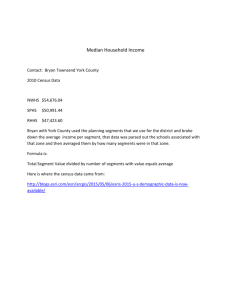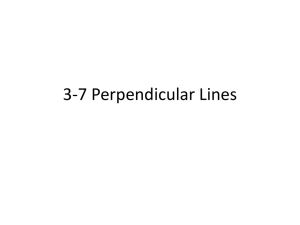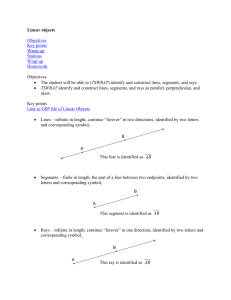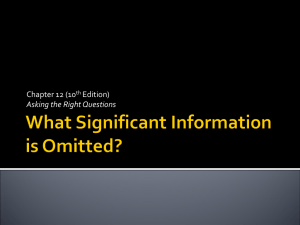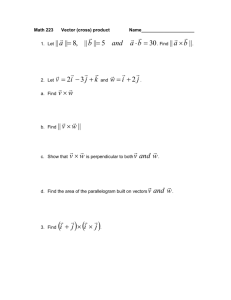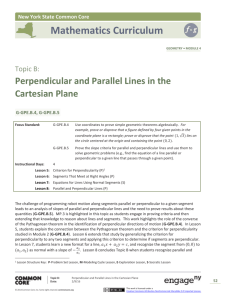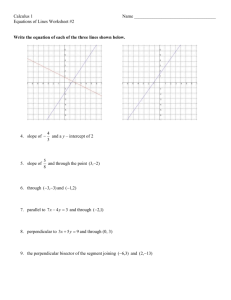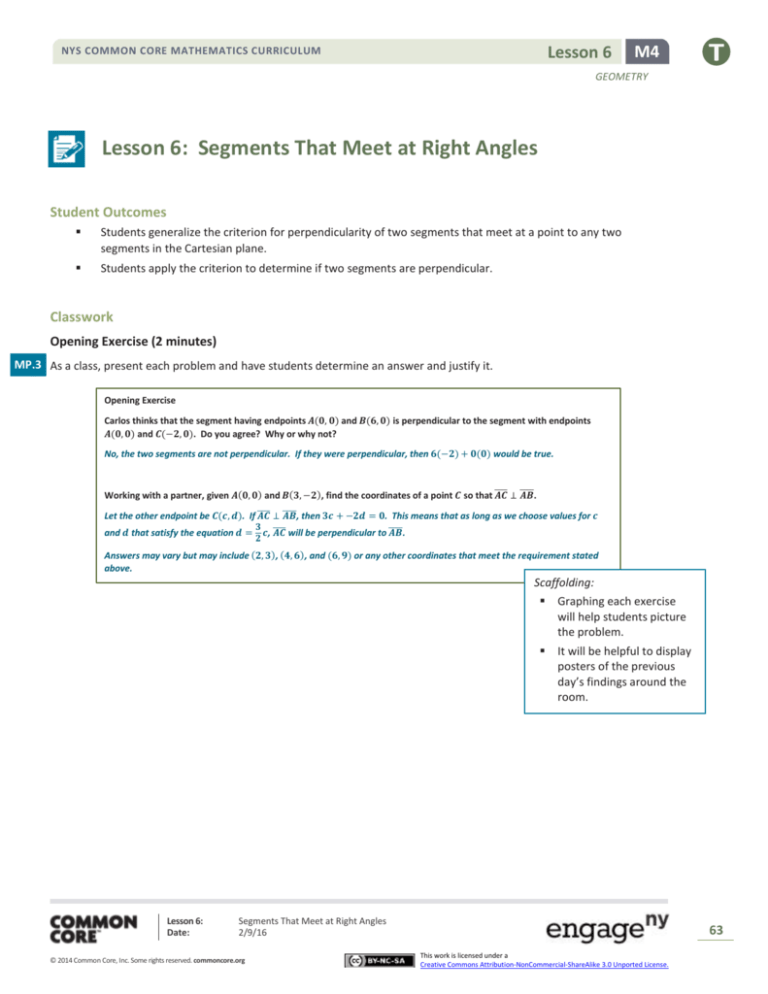
Lesson 6
NYS COMMON CORE MATHEMATICS CURRICULUM
M4
GEOMETRY
Lesson 6: Segments That Meet at Right Angles
Student Outcomes
Students generalize the criterion for perpendicularity of two segments that meet at a point to any two
segments in the Cartesian plane.
Students apply the criterion to determine if two segments are perpendicular.
Classwork
Opening Exercise (2 minutes)
MP.3 As a class, present each problem and have students determine an answer and justify it.
Opening Exercise
Carlos thinks that the segment having endpoints 𝑨(𝟎, 𝟎) and 𝑩(𝟔, 𝟎) is perpendicular to the segment with endpoints
𝑨(𝟎, 𝟎) and 𝑪(−𝟐, 𝟎). Do you agree? Why or why not?
No, the two segments are not perpendicular. If they were perpendicular, then 𝟔(−𝟐) + 𝟎(𝟎) would be true.
Working with a partner, given 𝑨(𝟎, 𝟎) and 𝑩(𝟑, −𝟐), find the coordinates of a point 𝑪 so that ̅̅̅̅
𝑨𝑪 ⊥ ̅̅̅̅
𝑨𝑩.
̅̅̅̅ ⊥ 𝑨𝑩
̅̅̅̅, then 𝟑𝒄 + −𝟐𝒅 = 𝟎. This means that as long as we choose values for 𝒄
Let the other endpoint be 𝑪(𝒄, 𝒅). If 𝑨𝑪
𝟑 ̅̅̅̅
̅̅̅̅.
and 𝒅 that satisfy the equation 𝒅 = 𝒄, 𝑨𝑪
will be perpendicular to 𝑨𝑩
𝟐
Answers may vary but may include (𝟐, 𝟑), (𝟒, 𝟔), and (𝟔, 𝟗) or any other coordinates that meet the requirement stated
above.
Scaffolding:
Graphing each exercise
will help students picture
the problem.
It will be helpful to display
posters of the previous
day’s findings around the
room.
Lesson 6:
Date:
Segments That Meet at Right Angles
2/9/16
© 2014 Common Core, Inc. Some rights reserved. commoncore.org
63
This work is licensed under a
Creative Commons Attribution-NonCommercial-ShareAlike 3.0 Unported License.
Lesson 6
NYS COMMON CORE MATHEMATICS CURRICULUM
M4
GEOMETRY
Example 1 (10 minutes)
In this example, we are trying to get students to see that translating segments may help us determine whether the lines
containing the segments are perpendicular.
Example 1
̅̅̅̅ perpendicular? Are the lines
̅̅̅̅ and 𝑪𝑫
Given points 𝑨(𝟐, 𝟐), 𝑩(𝟏𝟎, 𝟏𝟔), 𝑪(−𝟑, 𝟏), and 𝑫(𝟒, −𝟑), are segments 𝑨𝑩
containing the segments perpendicular? Explain.
One possible solution would be to translate ̅̅̅̅
𝑨𝑩 so that 𝑨′ is on the origin
̅̅̅̅ so that
(using the vector ⟨−𝟐, −𝟐⟩, or left 𝟐 down 𝟐) and to translate 𝑪𝑫
𝑪′ is on the origin (using the vector ⟨𝟑, −𝟏⟩, right 𝟑 down 𝟏):
𝑨′ (𝟎, 𝟎), 𝑩′ (𝟏𝟎 − 𝟐, 𝟏𝟔 − 𝟐), 𝑪′ (𝟎, 𝟎), and 𝑫′ (𝟒 − (−𝟑), −𝟑 − 𝟏).
̅̅̅̅̅̅ is perpendicular to 𝑪′𝑫′
̅̅̅̅̅̅.
̅̅̅̅ if 𝑨′𝑩′
̅̅̅̅ will be perpendicular to 𝑪𝑫
𝑨𝑩
𝟖(𝟕) + 𝟏𝟒(−𝟒) = 𝟎; therefore, ̅̅̅̅̅̅
𝑨′𝑩′ is perpendicular to ̅̅̅̅̅̅
𝑪′ 𝑫′ , which
̅̅̅̅.
̅̅̅̅ ⊥ 𝑪𝑫
means 𝑨𝑩
𝑨′ (𝟎, 𝟎), 𝑩′ (𝟏𝟎 − 𝟐, 𝟏𝟔 − 𝟐), 𝑪′ (𝟎, 𝟎), and 𝑫′ (𝟒 − (−𝟑), −𝟑 − 𝟏).
̅̅̅̅
𝑨𝑩
𝟖(𝟕) + 𝟏𝟒(−𝟒) = 𝟎.
Working in pairs, each student selects two points to be the endpoint of a segment. One partner identifies the
coordinates of points 𝐴 and 𝐵, and the other partner chooses coordinates for points 𝐶 and 𝐷. Although the
likelihood of this happening is low, students may choose one of the same points, but not both. The students
then plot the points on the same coordinate plane and construct segments ̅̅̅̅
𝐴𝐵 and ̅̅̅̅
𝐶𝐷 .
The students must now determine whether the segments are perpendicular.
How do your segments differ from those we worked with in Lesson 5?
No. If we translate the segments, thereby translating the lines containing the segments, the angles
formed by the two lines will not change. If the lines were perpendicular, the images of the lines under
translation will also be perpendicular.
With your partner, translate each of your segments so that they have an endpoint at the origin. Then, use the
results of yesterday’s lesson to determine whether the two segments are perpendicular
In that lesson, both segments had one endpoint located at the origin.
Would translating your two segments change their orientation?
MP.1
&
MP.3
Answers will vary. Some students will say no because they do not intersect. Students should recognize
that, unless the segments are parallel, if we extend the segments, the lines containing the segments will
intersect.
Answers will vary.
Switch papers with another pair of students and confirm their results.
Lesson 6:
Date:
Segments That Meet at Right Angles
2/9/16
© 2014 Common Core, Inc. Some rights reserved. commoncore.org
64
This work is licensed under a
Creative Commons Attribution-NonCommercial-ShareAlike 3.0 Unported License.
Lesson 6
NYS COMMON CORE MATHEMATICS CURRICULUM
M4
GEOMETRY
Exercise 1 (5 minutes)
Have students try Exercise 1 using the example just completed as a template. You may pull aside some groups for
targeted instruction.
Exercise 1
Given 𝑨(𝒂𝟏 , 𝒂𝟐 ), 𝑩(𝒃𝟏 , 𝒃𝟐 ), 𝑪(𝒄𝟏 , 𝒄𝟐 ), and 𝑫(𝒅𝟏 , 𝒅𝟐 ), find a general formula in terms of 𝒂𝟏 , 𝒂𝟐 , 𝒃𝟏 , 𝒃𝟐 , 𝒄𝟏 , 𝒄𝟐 , 𝒅𝟏 ,
and 𝒅𝟐 that will let us determine whether segments ̅̅̅̅
𝑨𝑩 and ̅̅̅̅
𝑪𝑫 are perpendicular.
1.
After translating the segments so that the image of points 𝑨 and 𝑪 lie on the origin, we get 𝑨′ (𝟎, 𝟎),
𝑩′ (𝒃𝟏 − 𝒂𝟏 , 𝒃𝟐 − 𝒂𝟐 ), 𝑪′ (𝟎, 𝟎), and 𝑫′ (𝒅𝟏 − 𝒄𝟏 , 𝒅𝟐 − 𝒄𝟐 ).
̅̅̅̅̅̅
𝑨′𝑩′ ⊥ ̅̅̅̅̅̅
𝑪′ 𝑫′ ↔ (𝒃𝟏 − 𝒂𝟏 )(𝒅𝟏 − 𝒄𝟏 ) + (𝒃𝟐 − 𝒂𝟐 )(𝒅𝟐 − 𝒄𝟐 ) = 𝟎
Example 2 (7 minutes)
In this example, we are going to have students use the formula they derived in Exercise 1 to find the location of one
endpoint of a segment given the other endpoint and the coordinates of the endpoints of a perpendicular segment.
Because there are an infinite number of possible endpoints, we will only ask students to determine one unknown
coordinate given the other.
Given ̅̅̅̅
𝐴𝐵 ⊥ ̅̅̅̅
𝐶𝐷 and 𝐴(3, 2), 𝐵(7, 10), 𝐶(−2, −3), and 𝐷(4, 𝑑2 ), find the value of 𝑑2 . While we will be using
the formula that we derived in Exercise 1, it will be helpful if you explain each of the steps as you are solving
the problem.
Using the formula we derived in the previous exercise, we can write the equation
(7 − 3)(4 + 2) + (10 − 2)(𝑑2 + 3) = 0.
We translated ̅̅̅̅
𝐴𝐵 to ̅̅̅̅̅̅
𝐴′𝐵′ so that 𝐴′ is located at the origin. We moved three units to the left and down
two units giving us 𝐵′(7 − 3, 10 − 2).
̅̅̅̅̅̅ so that 𝐶′ is located at the origin. We moved two units to the right and up
We translated ̅̅̅̅
𝐷𝐶 to 𝐶′𝐷′
three units giving us 𝐷′(4 + 2, 𝑑2 + 3).
4(6) + 8(𝑑2 + 3) = 0
𝑑2 + 3 = 3
𝑑2 = 0
Teachers can assign different exercises to different students or groups and then bring the class back together to share.
Some students may be able to complete all exercises while others may need more guidance.
Lesson 6:
Date:
Segments That Meet at Right Angles
2/9/16
© 2014 Common Core, Inc. Some rights reserved. commoncore.org
65
This work is licensed under a
Creative Commons Attribution-NonCommercial-ShareAlike 3.0 Unported License.
Lesson 6
NYS COMMON CORE MATHEMATICS CURRICULUM
M4
GEOMETRY
Exercises 2–4 (14 minutes)
2.
Recall the Opening Exercise of Lesson 4 in which a robot is traveling along a linear path given by the equation
𝒚 = 𝟑𝒙 − 𝟔𝟎𝟎. The robot hears a ping from a homing beacon when it reaches the point 𝑩(𝟒𝟎𝟎, 𝟔𝟎𝟎) and turns to
𝟏
𝟑
travel along a linear path given by the equation 𝒚 − 𝟔𝟎𝟎 = − (𝒙 − 𝟒𝟎𝟎). If the homing beacon lies on the 𝒙-axis,
what is its exact location? (Use your own graph paper to visualize the scenario.)
a.
If point 𝑨 is the 𝒚-intercept of the original equation, what are the coordinates of point 𝑨?
𝑨(𝟎, −𝟔𝟎𝟎)
b.
What are the endpoints of the original segment of motion?
𝑨(𝟎, −𝟔𝟎𝟎) and 𝑩(𝟒𝟎𝟎, 𝟔𝟎𝟎)
c.
If the beacon lies on the 𝒙-axis, what is the 𝒚-value of this point, 𝑪?
𝟎
d.
Translate point 𝑩 to the origin. What are the coordinates of 𝑨′, 𝑩′, and 𝑪′?
𝑨′ (−𝟒𝟎𝟎, −𝟏𝟐𝟎𝟎), 𝑩′ (𝟎, 𝟎), and 𝑪′(𝒄𝟏 , −𝟔𝟎𝟎)
e.
Use the formula derived in this lesson to determine the coordinates of point 𝑪.
̅̅̅̅, so −𝟒𝟎𝟎(𝒄𝟏 ) + (−𝟏𝟐𝟎𝟎)(−𝟔𝟎𝟎) = 𝟎 ↔ 𝒄𝟏 = 𝟏𝟖𝟎𝟎
̅̅̅̅ ⊥ 𝑩𝑪
We know that 𝑨𝑩
𝑪′(𝟏𝟖𝟎𝟎, −𝟔𝟎𝟎) ↔ 𝑪(𝟐𝟐𝟎𝟎, 𝟎)
(𝟐𝟐𝟎𝟎, 𝟎)
Lesson 6:
Date:
Segments That Meet at Right Angles
2/9/16
© 2014 Common Core, Inc. Some rights reserved. commoncore.org
66
This work is licensed under a
Creative Commons Attribution-NonCommercial-ShareAlike 3.0 Unported License.
Lesson 6
NYS COMMON CORE MATHEMATICS CURRICULUM
M4
GEOMETRY
3.
A triangle in the coordinate plane has vertices 𝑨(𝟎, 𝟏𝟎), 𝑩(−𝟖, 𝟖), and 𝑪(−𝟑, 𝟓). Is it a right triangle? If so, at
which vertex is the right angle? (Hint: Plot the points and draw the triangle on a coordinate plane to help you
determine which vertex is the best candidate for the right angle.)
The most likely candidate appears to be vertex 𝑪. By
translating the figure so that 𝑪 is mapped to the origin, we can
use the formula
(−𝟖 + 𝟑)(𝟎 + 𝟑) + (𝟖 − 𝟓)(𝟏𝟎 − 𝟓) = 𝟎
−𝟓(𝟑) + 𝟑(𝟓) = 𝟎
̅̅̅̅ ⊥ 𝑨𝑪
̅̅̅̅.
𝟎 = 𝟎 ↔ 𝑩𝑪
Yes, segments ̅̅̅̅
𝑩𝑪 and ̅̅̅̅
𝑨𝑪 are perpendicular. The right angle is
𝑪.
4.
𝑨(−𝟕, 𝟏), 𝑩(−𝟏, 𝟑), 𝑪(𝟓, −𝟓), and 𝑫(−𝟓, −𝟓) are vertices of a quadrilateral. If ̅̅̅̅
𝑨𝑪 bisects ̅̅̅̅̅
𝑩𝑫, but ̅̅̅̅̅
𝑩𝑫 does not
̅̅̅̅, determine whether 𝑨𝑩𝑪𝑫 is a kite.
bisect 𝑨𝑪
̅̅̅̅ ⊥ 𝑩𝑫
̅̅̅̅̅.
We can show 𝑨𝑩𝑪𝑫 is a kite if 𝑨𝑪
Translating ̅̅̅̅
𝑨𝑪 so that the image of point 𝑨 lies on the origin and translating ̅̅̅̅̅
𝑩𝑫 so that the image of point 𝑩 lies at
the origin leads to the equation:
(𝟓 + 𝟕)(−𝟓 + 𝟏) + (−𝟓 − 𝟏)(−𝟓 − 𝟑) = 𝟎
(𝟏𝟐)(−𝟒) + (−𝟔)(−𝟖) = 𝟎,
̅̅̅̅ ⊥ 𝑩𝑫
̅̅̅̅̅, and 𝑨𝑩𝑪𝑫 is a kite.
−𝟒𝟖 + 𝟒𝟖 = 𝟎 is a true statement; therefore, 𝑨𝑪
Closing (2 minutes)
As a class, revisit the two theorems of today’s lesson and have students explain the difference between them.
Given points 𝑂(0, 0), 𝐴(𝑎1 , 𝑎2 ), 𝐵(𝑏1 , 𝑏2 ), 𝐶(𝑐1 , 𝑐2 ), and 𝐷(𝑑1 , 𝑑2 ),
̅̅̅̅ ⊥ 𝑂𝐵
̅̅̅̅ ↔ (𝑎1 )(𝑏1 ) + (𝑎2 )(𝑏2 ) = 0;
𝑂𝐴
̅̅̅̅
𝐴𝐵 ⊥ ̅̅̅̅
𝐶𝐷 ↔ (𝑏1 − 𝑎1 )(𝑑1 − 𝑐1 ) + (𝑏2 − 𝑎2 )(𝑑2 − 𝑐2 ) = 0.
Exit Ticket (5 minutes)
Lesson 6:
Date:
Segments That Meet at Right Angles
2/9/16
© 2014 Common Core, Inc. Some rights reserved. commoncore.org
67
This work is licensed under a
Creative Commons Attribution-NonCommercial-ShareAlike 3.0 Unported License.
Lesson 6
NYS COMMON CORE MATHEMATICS CURRICULUM
M4
GEOMETRY
Name
Date
Lesson 6: Segments That Meet at Right Angles
Exit Ticket
Given points 𝑆(2, 4), 𝑇(7, 6), 𝑈(−3, −4), and 𝑉(−1, −9):
̅̅̅ and ̅̅̅̅
a. Translate segments ̅𝑆𝑇
𝑈𝑉 so that the image of
each segment has an endpoint at the origin.
𝑻(𝟕, 𝟔)
𝑺(𝟐, 𝟒)
𝑼(−𝟑, −𝟒)
b.
Are the segments perpendicular? Explain.
𝑽(−𝟏, −𝟗)
c.
⃡ and ⃡𝑈𝑉 perpendicular? Explain.
Are the lines 𝑆𝑇
Lesson 6:
Date:
Segments That Meet at Right Angles
2/9/16
© 2014 Common Core, Inc. Some rights reserved. commoncore.org
68
This work is licensed under a
Creative Commons Attribution-NonCommercial-ShareAlike 3.0 Unported License.
Lesson 6
NYS COMMON CORE MATHEMATICS CURRICULUM
M4
GEOMETRY
Exit Ticket Sample Solutions
Given points 𝑺(𝟐, 𝟒), 𝑻(𝟕, 𝟔), 𝑼(−𝟑, −𝟒), and 𝑽(−𝟏, −𝟗):
a.
Translate segments ̅̅̅̅
𝑺𝑻 and ̅̅̅̅
𝑼𝑽 so that the image of each
segment has an endpoint at the origin.
Answers can vary slightly. Students will have to choose one
of the first two and one of the second two.
If we translate ̅̅̅̅
𝑺𝑻 so that the image of 𝑺 is at the origin,
we get 𝑺′(𝟎, 𝟎), 𝑻′(𝟓, 𝟐).
If we translate ̅̅̅̅
𝑺𝑻 so that the image of 𝑻 is at the origin,
we get 𝑺′(−𝟓, −𝟐), 𝑻′(𝟎, 𝟎).
̅̅̅̅ so that the image of 𝑼 is at the origin, we
If we translate 𝑼𝑽
get 𝑼′(𝟎, 𝟎), 𝑽′(𝟐, −𝟓).
̅̅̅̅ so that the image of 𝑽 is at the origin, we
If we translate 𝑼𝑽
get 𝑽′(𝟎, 𝟎), 𝑼′(−𝟐, 𝟓).
b.
Are the segments perpendicular? Explain.
̅̅̅̅̅ and ̅̅̅̅̅̅
Yes. By choosing any two of the translated segment 𝑺′𝑻′
𝑼′ 𝑽′ , we determine whether the equation yields
a true statement: (𝒃𝟏 − 𝒂𝟏 )(𝒅𝟏 − 𝒄𝟏 ) + (𝒃𝟐 − 𝒂𝟐 )(𝒅𝟐 − 𝒄𝟐 ) = 𝟎.
For example, using 𝑺(−𝟓, −𝟐), 𝑻′(𝟎, 𝟎), and 𝑼′(𝟎, 𝟎), 𝑽′(𝟐, −𝟓):
̅̅̅̅̅ ⊥ 𝑼′𝑽′
̅̅̅̅̅̅ and 𝑺𝑻
̅̅̅̅ ⊥ 𝑼𝑽
̅̅̅̅.
−𝟓(𝟐) + (−𝟐)(𝟓) = 𝟎 is a true statement; therefore, 𝑺′𝑻′
c.
Are the lines ⃡𝑺𝑻 and ⃡𝑼𝑽 perpendicular? Explain.
Yes, lines containing perpendicular segments are also perpendicular.
Problem Set Sample Solutions
1.
Are the segments through the origin and the points listed perpendicular? Explain.
a.
𝑨(𝟗, 𝟏𝟎), 𝑩(𝟏𝟎, 𝟗)
Give students steps to follow to
make problems more
accessible.
No; 𝟗 ∙ 𝟏𝟎 + 𝟏𝟎 ∙ 𝟗 ≠ 𝟎.
b.
𝑪(𝟗, 𝟔), 𝑫(𝟒, −𝟔)
Yes; 𝟗 ∙ 𝟒 + 𝟔 ∙ (−𝟔) = 𝟎.
2.
̅̅̅̅̅ and 𝑴𝑵
̅̅̅̅̅ perpendicular?
Given 𝑴(𝟓, 𝟐), 𝑵(𝟏, −𝟒), and 𝑳 listed below, are segments 𝑳𝑴
Translate 𝑴 to the origin, write the coordinates of the images of the points, then explain
without using slope.
a.
𝑳(−𝟏, 𝟔)
𝑴′(𝟎, 𝟎), 𝑵′(−𝟒, −𝟔), 𝑳(−𝟔, 𝟒)
Yes; (−𝟒) ∙ (−𝟔) + (−𝟔) ∙ 𝟒 = 𝟎.
Lesson 6:
Date:
Scaffolding:
1.
Plot the points.
2.
Find the common
endpoint.
3.
Translate that to (0, 0).
4.
Translate the other points.
5.
Use the formula
(𝑎1 )(𝑏1 ) + (𝑎2 )(𝑏2 ) = 0
to determine
perpendicularity.
Segments That Meet at Right Angles
2/9/16
© 2014 Common Core, Inc. Some rights reserved. commoncore.org
69
This work is licensed under a
Creative Commons Attribution-NonCommercial-ShareAlike 3.0 Unported License.
Lesson 6
NYS COMMON CORE MATHEMATICS CURRICULUM
M4
GEOMETRY
b.
𝑳(𝟏𝟏, −𝟐)
𝑴′(𝟎, 𝟎), 𝑵′(−𝟒, −𝟔), 𝑳(𝟔, −𝟒)
Yes; (−𝟒) ∙ 𝟔 + (−𝟔) ∙ (−𝟒) = 𝟎.
c.
𝑳(𝟗, 𝟖)
𝑴′(𝟎, 𝟎), 𝑵′(−𝟒, −𝟔), 𝑳(𝟒, 𝟔)
No; (−𝟒) ∙ 𝟒 + (−𝟔) ∙ 𝟔 ≠ 𝟎.
3.
Is triangle 𝑷𝑸𝑹, where 𝑷(−𝟕, 𝟑), 𝑸(−𝟒, 𝟕), and 𝑹(𝟏, −𝟑), a right triangle? If so, which angle is the right angle?
Justify your answer.
Yes. If the points are translated to 𝑷′(𝟎, 𝟎), 𝑸′(𝟑, 𝟒), and 𝑹′(𝟖, −𝟔), 𝟑(𝟖) + 𝟒(−𝟔) = 𝟎, meaning the segments are
perpendicular. The right angle is 𝑷.
4.
A quadrilateral has vertices (𝟐 + √𝟐, −𝟏), (𝟖 + √𝟐, 𝟑), (𝟔 + √𝟐, 𝟔), and (√𝟐, 𝟐). Prove that the quadrilateral is a
rectangle.
Answers will vary, but it is a rectangle because it has 𝟒 right angles.
5.
Given points 𝑮(−𝟒, 𝟏), 𝑯(𝟑, 𝟐), and 𝑰(−𝟐, −𝟑), find the 𝒙-coordinate of point 𝑱 with 𝒚-coordinate 𝟒 so that the
⃡ and ⃡𝑰𝑱 are perpendicular.
lines 𝑮𝑯
−𝟑
6.
A robot begins at position (−𝟖𝟎, 𝟒𝟓) and moves on a path to (𝟏𝟎𝟎, −𝟔𝟎). It turns 𝟗𝟎° counterclockwise.
a.
What point with 𝒚-coordinate 𝟏𝟐𝟎 is on this path?
(𝟐𝟎𝟓, 𝟏𝟐𝟎)
b.
Write an equation of the line after the turn.
𝒚 + 𝟔𝟎 =
c.
𝟏𝟐
(𝒙 − 𝟏𝟎𝟎)
𝟕
If it stops to charge on the 𝒙-axis, what is the location of the charger?
(𝟏𝟑𝟓, 𝟎)
7.
Determine the missing vertex of a right triangle with vertices (𝟔, 𝟐) and (𝟓, 𝟓) if the third vertex is on the 𝒚-axis.
Verify your answer by graphing.
(𝟎,
8.
𝟏𝟎
)
𝟑
Determine the missing vertex for a rectangle with vertices (𝟑, −𝟐), (𝟓, 𝟐), and (−𝟏, 𝟓), and verify by graphing.
Then, answer the questions that follow.
(−𝟑, 𝟏)
a.
What is the length of the diagonal?
Approximately 𝟖. 𝟎𝟔 units
Lesson 6:
Date:
Segments That Meet at Right Angles
2/9/16
© 2014 Common Core, Inc. Some rights reserved. commoncore.org
70
This work is licensed under a
Creative Commons Attribution-NonCommercial-ShareAlike 3.0 Unported License.
Lesson 6
NYS COMMON CORE MATHEMATICS CURRICULUM
M4
GEOMETRY
b.
What is a point on both diagonals in the interior of the figure?
𝟑
(𝟏, )
𝟐
9.
A right triangle has vertices (𝟏, 𝟑) and (𝟔, −𝟏) and a third vertex located in Quadrant IV.
a.
Determine the coordinates of the missing vertex.
(𝟐, −𝟔)
b.
Reflect the triangle across the 𝒚-axis. What are the new vertices?
(−𝟏, 𝟑), (−𝟔, −𝟏), and(−𝟐, −𝟔)
c.
If the original triangle is rotated 𝟗𝟎° counterclockwise about the vertex (𝟔, −𝟏), what are the coordinates of
the other vertices?
(𝟐, −𝟔), (𝟏𝟏, −𝟓)
d.
Now rotate the original triangle 𝟗𝟎° clockwise about (𝟔, −𝟏). What are the coordinates of the other
vertices?
(𝟏, 𝟑), (𝟏𝟎, 𝟒)
e.
What do you notice about both sets of vertices? Explain what you observe.
One rotated vertex moves onto one of the original vertices, and the third vertex is different. This is because
we are rotating the triangle 𝟗𝟎° about the right angle.
Lesson 6:
Date:
Segments That Meet at Right Angles
2/9/16
© 2014 Common Core, Inc. Some rights reserved. commoncore.org
71
This work is licensed under a
Creative Commons Attribution-NonCommercial-ShareAlike 3.0 Unported License.

